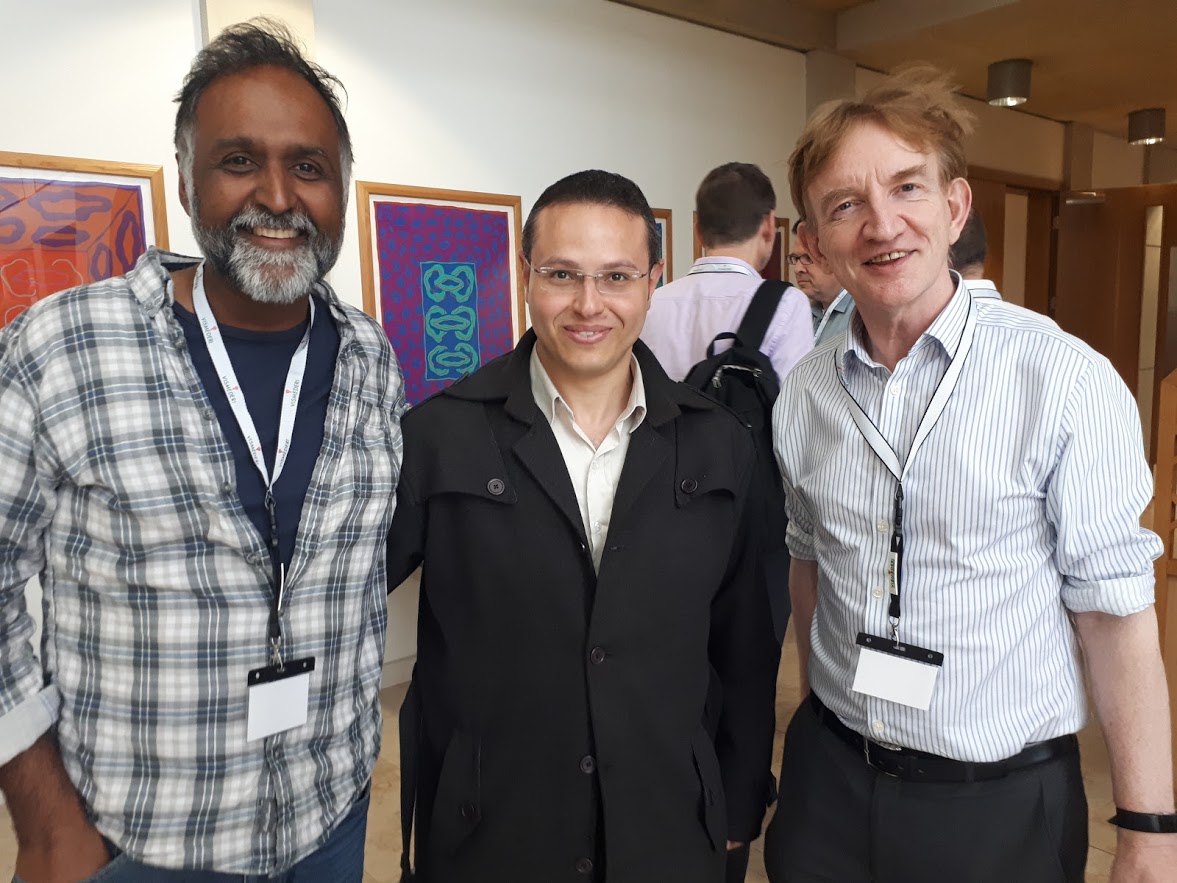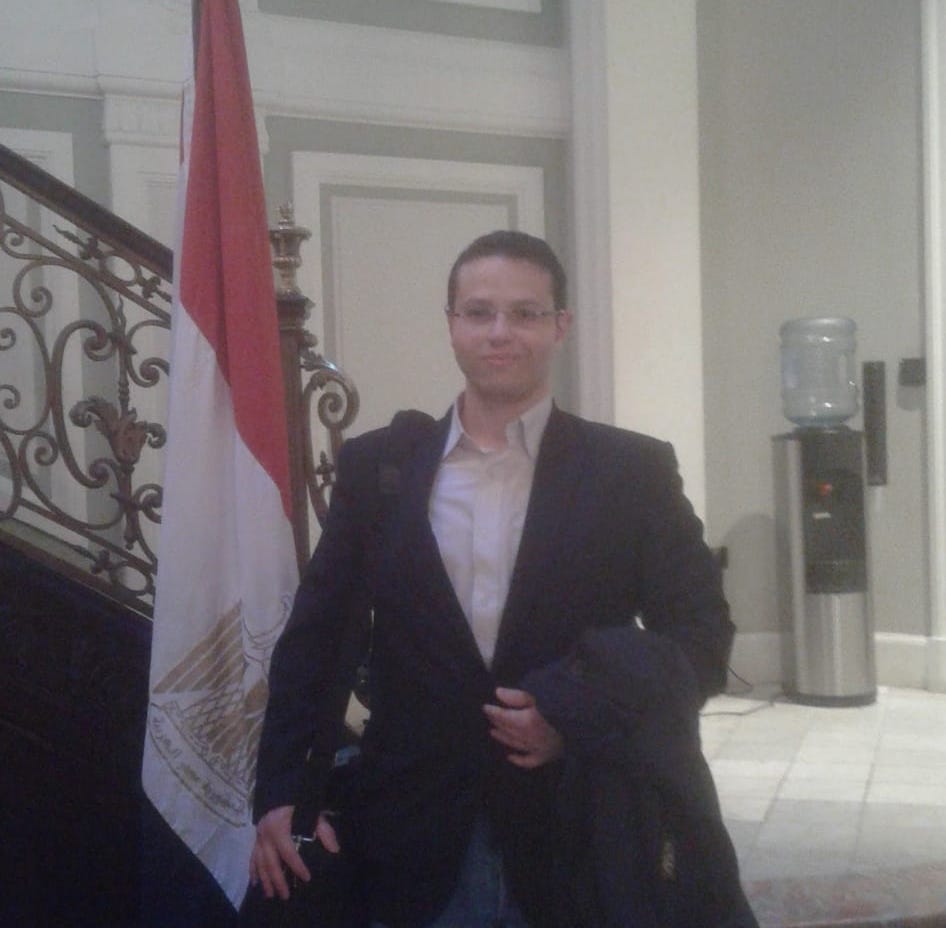There are more than 125 potential candidates but increasingly positive noises coming from Oxford University and the pharmaceutical firm AstraZeneca suggest that they are now the front runners in developing the vaccine. Egypt-born Dr. Ahmed Salman is one of the leading scientists involved in its development at the Oxford University’s Jenner Institute.
The Post-doctoral Immunologist (Vaccinology) took his BSc degree in Biochemistry at Ain Shams University in Cairo in 2006 and from then until late 2011 was an instructor at the Department of Biochemistry, Faculty of Science, Ain Shams University. He completed a successful Master’s degree there on tuberculosis immunology in 2011. In 2011 Dr Salman won a PhD scholarship at the European Virtual Malaria Institute programme “EVIMalaR” funded by the European Commission. Dr Salman produced his DPhil thesis in October 2014 and the DPhil degree in Clinical Medicine was awarded to him in May 2015 from the University of Oxford. He has recently been awarded an MRC Confidence in Concept grant in his own name to assess one of the novel vaccine candidates discovered during his DPhil project.
Dr Salman was kind enough to take some time out of his day to answer a few questions. The interview has been edited for clarity and brevity.
At what stage are you in your quest for a vaccine against Covid-19, and what comes next?
We are currently testing a COVID-19 vaccine in human volunteers in the third and final phase of the clinical studies which officially began in the UK on May 22 and will enrol up to 10,000 participants across the country. On July 1, we began human trials in Brazil and South Africa, where 4,000 and 2,000 participants are being enrolled, respectively. Oxford and AstraZeneca are also collaborating on a Phase III trial in the US enrolling 30,000 patients which will begin this month. This will bring the total number of human volunteers in the third and final stage of clinical trials to 46,000. If the data, which will be published in a scientific journal, shows promising results in at least 50% of participants in clinical trials and is granted approval, then we will move into the manufacturing phase.
What happens in the human trial and what is the risk to participants?
Volunteers for clinical trials are fully informed of potential risks. The advantage of the Oxford vaccine is that it uses a viral vector based on a harmless, weakened version of the common cold (chimpanzee adenovirus) containing the genetic material of SARS-CoV-2 spike protein. This viral vector vaccine is very low risk and has been through over 12 clinical trials for different diseases including Ebola, MERS and Malaria and showed high safety profile. The findings from the Phase I/II trial involving 1100 participants, half of whom were given a placebo, provided strong evidence that the vaccine is safe and poses almost no risk. Although it can cause temporary side effects such as a fever and injection-site inflammation, this is rare and can be reduced by use of paracetamol. The current Phase III trials will further test the vaccine’s safety.
It usually takes years to develop and manufacture a successful vaccine but the unprecedented scale of the current Covid-19 pandemic has led to a vaccine 'race' with rapid timelines amid political, media and public pressure. Can you describe how are you dealing with this? Is it safe to “fast-track” a vaccine?
Under normal circumstances without the acute global pressures of a pandemic, developing a vaccine takes up to 10-15 years, but this is mainly due to funding and administrative issues. Researchers need years to secure funding, get approvals and to study and publish results, with months of waiting at every stage of the development cycle. It is also an expensive and competitive endeavour. Phase I, requires at least £1-2million, Phase II, around £10-20 million and Phase III requires upwards of £100 million. Under normal circumstances this funding doesn’t come easy as it carries significant risks for the funders and there is huge competition between labs. However, the urgency of the coronavirus pandemic has accelerated the whole process. AstraZeneca has already struck deals to provide 2 billion doses – this certainly doesn’t happen with other illnesses. The accelerated speed of development certainly does not mean a compromise on safety or any scientific steps; only the administrative timelines such as funding, approvals and paperwork are condensed and not the various stages of testing.

Some research suggests that COVID-19 patients have lost protective immunity within two to three months of recovery, suggesting that antibodies do not last in the blood and therefore immunity is temporary and a second infection is possible. This raises the question: if natural antibodies decrease so quickly, how long will antibodies that are produced as a response to a vaccine last?
The results from early-stage, human clinical trials published in the British medical journal The Lancet on July 20, 2020 found that both the antibody producing B cells and the Cytotoxic T cell responses produced by the vaccine lasted for 3 months in all the participants and continued to be detected until the day of publication. Only time will tell how long protection will last but based on Oxford's work with a similar vaccine for another human coronavirus disease, the Middle East Respiratory Syndrome (MERS), which also used the chimpanzee adenoviruses containing the genetic material of MERS spike protein as a novel vaccine vector, strong immunity lasted for 2-3 years.
It is true that research has indicated that the number of antibodies generated from a natural infection with the novel coronavirus drop within a short period of time, heightening the concern that a second infection is possible, however, the mechanisms that stimulate the immune system to produce neutralizing antibodies and cellular immunity could be different to those that produce vaccine-induced immunity. Moreover, an efficient vaccine should not make you sick with the disease or suffer serious symptoms that could have a negative impact on the immune system. We hope that the ‘memory’ cells that remember and recognise specific viruses will provide long-lasting protection, but we cannot say for certain how long immunity will last until it is tested.
Are you optimistic that after the vaccine is successfully developed, distributed and the majority of the population gets vaccinated, that we will return to previous normality?
We must be optimistic, but cautious. Herd immunity, protection that occurs when at least 60-70 percent of a population has become immune to an infection, is the key to ending the pandemic and getting life back to normal. There are two ways of achieving herd immunity: 60 – 70% of the population becomes infected and develops immunity (naturally acquired herd immunity) or gets a protective vaccine (vaccine-based herd immunity). The former comes with a huge toll in terms of human lives and economic activity as we have seen with other deadly infectious diseases and pandemics throughout history which is why we are working towards widespread vaccination to control or hopefully eradicate the disease.
Will a COVID-19 vaccine be rolled out by the end of the year and what measures can be taken to ensure vaccines reach all those in need?
In the best-case scenario; the results of the phase III trials will become available once the studies are completed in September/early October. Based on the available parameters we optimistically expect that the vaccine will be 80% effective, but we cannot say for certain until the trials are completed. However, the vaccine only needs to be proven to have at least 50% efficacy to be approved and for large-scale manufacturing to commence. We expect to manufacture 1 billion doses by the end of 2020/early 2021. We will then start on the subsequent manufacturing cycles with each cycle taking 3-6 months until we reach up to 4 billion doses within 2 years.
AstraZeneca has officially reached agreements to supply 300 million doses to the US and UK and 400 million doses to Germany, France, Italy and the Netherlands. The British drug-maker has also partnered with the Serum Institute of India (SII) to manufacture 400 million vaccines being developed by Oxford University by the end of 2020/early2021.
There are various bodies such as the World Health Organization, Gavi The Vaccine Alliance, Bill and Melinda Gates Foundation, the Coalition for Epidemic Preparedness Innovations (CEPI) and others that are working to ensure the fair and equitable distribution of Covid-19 vaccines for every country, rich and poor. AstraZeneca have pledged to market vaccines at no profit during the pandemic by making it available globally at cost price which is about 5-7 dollars per dose.

What message would you like to leave our readers with?
I would like to make a humanitarian call to action to the Arab world. It is imperative that we invest in scientific research, particularly in the fields of vaccine development, infectious diseases, immunology and pandemics. It is incredibly unfortunate that the entire Arab world lacks domestic vaccine manufacture facilities. This will greatly delay the vaccines' availability to the region. All the countries I mentioned earlier have not committed to buying the specified number of doses but have struck production licensing agreements with AstraZeneca to manufacture the vaccine in their own facilities as soon as it is approved. No single pharmaceutical company has the capacity to manufacture 7 billion doses of a vaccine in a short space of time. The vaccine supply chain involves not only manufacturing the vaccine contents, but special vials, storage and packaging components etc. This means that Arab countries will be left waiting months extra for other states to produce enough doses to inoculate their citizens and return to normalcy before producing doses which they could then distribute to countries that do not have the manufacturing capabilities.
I hope that as a region we learn some hard lessons from the devastation caused to lives, mental health, social life and the economy by the coronavirus. Developing and advancing in this field of research and building domestic vaccine production capabilities will go a long way in evading, or at the very least minimising, the catastrophic destruction of diseases and pandemics. My dream is that myself and other Arab scientists working in this field will one day establish an important and influential presence in the region, but this requires a unified effort and support, financial or otherwise, from every corner of society including governments and businessmen.
My message to your readers, governments, investors, media professionals, scientists, religious leaders and the public is that it is crucial that we raise public understanding and support for scientific research, the fundamental importance of which cannot be overstated.







